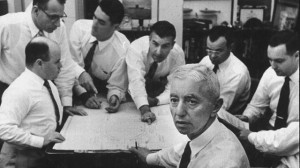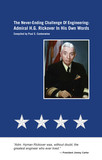Rickover, the father of the nuclear Navy, is described by PBS as a unique American hero, unafraid to buck the system and yet inspiring to the men under him.
 When few thought it possible, then-Captain Rickover undertook a quest to harness the power of the atom to drive the first nuclear-powered submarine, the USS Nautilus, whose trip under the polar ice pack was one of the great adventure stories of the 1950s, according to PBS. Later, Rickover was instrumental in the building of the world's first commercial nuclear power plant at Shippingport, Pa. Rickover's achievements made him into a national celebrity, and he appeared on the cover of Time magazine.
When few thought it possible, then-Captain Rickover undertook a quest to harness the power of the atom to drive the first nuclear-powered submarine, the USS Nautilus, whose trip under the polar ice pack was one of the great adventure stories of the 1950s, according to PBS. Later, Rickover was instrumental in the building of the world's first commercial nuclear power plant at Shippingport, Pa. Rickover's achievements made him into a national celebrity, and he appeared on the cover of Time magazine.
Many questioned Rickover's goal of a nuclear Navy. Others questioned his methods-PBS noted "his arrogant, high-handed behavior, and his creation of a technocratic elite, his own navy within the Navy." Few, however, contested that he had transformed the Navy and much of U.S. industry, and changed the course of America's technological development.
Today, as the United States looks for alternatives to fossil fuels such as nuclear power and tries to lower its carbon footprint, many wonder whether the nation can maintain its technological pre-eminence. Accordingly, PBS noted, "we would do well to consider the man who created the nuclear Navy, as well as the civilian nuclear power industry, Hyman Rickover."
 Manifold Productions has assembled a distinguished Board of Advisors for the documentary: Admiral Bruce DeMars, USN (Ret); Richard Hewlett, and Richard Rhodes.
Manifold Productions has assembled a distinguished Board of Advisors for the documentary: Admiral Bruce DeMars, USN (Ret); Richard Hewlett, and Richard Rhodes.
A book on Rickover-"The Never-Ending Challenge of Engineering: Admiral H.G. Rickover in His Own Words"-is available from the American Nuclear Society by clicking here.



 Manifold Productions has assembled a distinguished Board of Advisors for the documentary: Admiral Bruce DeMars, USN (Ret); Richard Hewlett, and Richard Rhodes.
Manifold Productions has assembled a distinguished Board of Advisors for the documentary: Admiral Bruce DeMars, USN (Ret); Richard Hewlett, and Richard Rhodes.